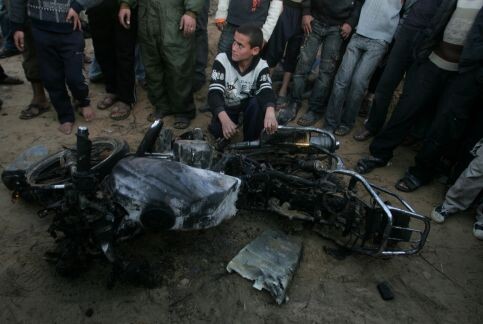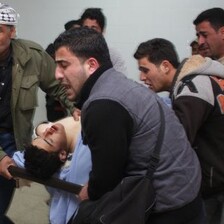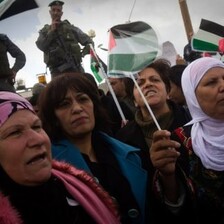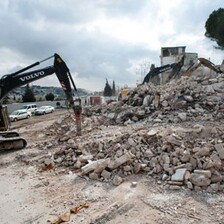The Electronic Intifada 11 January 2011

Palestinians surround a destroyed motorcycle following an Israeli air strike in Khan Younis, 11 January 2011. (Khaled Omar/Xinhua)
Israeli warplanes bombed two buildings south of Gaza City late tonight in an air strike targeting Hamas national security service buildings. Agence France-Presse reported that local officials and eyewitnesses said there were no casualties in the attacks, which happened around midnight (“Israeli warplanes in fresh strikes on Gaza: witnesses,” 12 January 2011).
Hours earlier, a Palestinian man was extrajudicially assassinated in an Israeli air strike as he rode a motorcycle near the southern Gaza Strip city of Khan Younis. Twenty-five-year-old Muhammad al-Najjar was killed and another passerby was injured, according to the Ma’an News Agency (“Medics: 1 dead in Gaza airstrike,” 11 January 2011).
The Israeli military stated that the air strike was a targeted attack against al-Najjar, claiming that he was a member of the armed faction of the Palestinian Islamic Jihad and was involved in the preparation of an attack against Israel. Ma’an added that earlier in the day, Taher al-Nunu, a spokesman for the Hamas-led government in Gaza, called on Palestinian resistance factions inside the Gaza Strip to comply with “what has been agreed on,” implying that Hamas would enforce the unofficial ceasefire with Israel. Al-Nunu added that government leaders were aiming to avoid yet another full-scale Israeli offensive on Gaza.
Since Israel’s 2008-09 winter invasion of Gaza, during which approximately 1,400 Palestinians were killed, including hundreds of children, the Hamas government and its armed wing have held to a ceasefire even as Israeli military attacks against Gaza have continued. Other armed factions unaffiliated with Hamas have claimed responsibility for rockets fired over the boundary with Israel.
Today’s air strike is the latest in a series of strikes and killings by the Israeli military against Palestinians in Gaza in recent days. Palestinian armed resistance factions have also fired numerous homemade projectiles across the boundary, with several injuries reported.
On Monday, 10 January, an Israeli soldier shot and killed a 65-year-old Palestinian man near the town of Beit Hanoun in the northern Gaza Strip. Arab News reported that Shaaban al-Qarmoot was killed by “unprovoked firing” by the soldier, who shot him from a sniper tower near the boundary with Israel (“Gaza farmer killed by Israeli soldiers,” 10 January 2011). Israel has regularly shot and injured or killed Palestinians who farm or collect raw industrial materials near the so-called “buffer zone,” a 300-meter-long area inside Gaza, running alongside the boundary wall constructed by Israel.
Following the killing of al-Qarmoot, Israeli fighter jets bombed three sites in Gaza. Two missiles hit areas near Khan Younis and one struck an open area east of Gaza City.
Ma’an reported that the Israeli military claimed the attacks were in response to Palestinian-fired rockets launched over the weekend (“Airstrikes hit two sites in Gaza, none injured,” 11 January 2011).
These attacks follow statements made by right-wing Israeli leaders on Sunday that their government needs to enact a policy of “zero tolerance” against Palestinian rocket fire. Uzi Landau, member of the ultra-nationalist party Yisrael Beiteinu, demanded Israel “exert a heavy price,” Ma’an reported.
Several rockets were launched from the Gaza Strip on Saturday and Sunday. The weekend rocket fire injured three foreign laborers working on a nearby kibbutz, according to the Israeli daily Haaretz (“Three foreign workers wounded in mortar attack near Gaza border,” 8 January 2011).
On Friday night, 7 January, an Israeli soldier was killed and four others wounded in an apparent “friendly fire” incident, when troops patrolling the boundary area attempted to launch a mortar shell into the Gaza Strip and the weapon misfired. Ma’an reported that Israeli media initially claimed that the death and injuries of the soldiers was the result of Palestinian rocket attacks, while Israel’s Channel 10 alleged that Palestinians “returned fire” at soldiers who shot at a group of Palestinians “trying to place a bomb” near the boundary (“Gaza: Israel soldier killed by friendly fire,” 9 January 2011).
Earlier that day, Palestinian armed factions fired several rockets across the boundary, with no injuries reported. The National Resistance Brigades — the armed wing of the Democratic Front for the Liberation of Palestine — claimed responsibility for the rocket fire and issued a statement saying the rockets were in response to Israeli aggression against the Gaza Strip, according to Ma’an News Agency (“DFLP-affiliated fighters say projectile fired towards Israel,” 7 January 2011).
On Wednesday, 5 January, Israeli fighter jets struck areas in the southern Gaza Strip near the town of Rafah, according to a report by the International Middle East Media Center (IMEMC) (“Two Israeli airstrikes hit Gaza overnight,” 5 January 2011). IMEMC added that the Israeli military claimed the air strikes were in response to Palestinian-fired rockets on Tuesday, 4 January, and that “training centers” for Hamas fighters were the target, as were underground tunnels at the Rafah-Egypt border.
That same day two men were shot and killed by Israeli forces while attempting to cross over the boundary with Israel. Initially, the identities of the two men were unknown and their bodies were not claimed by Palestinians inside Gaza but one of the men has since been identified as an Egyptian national, Reuters reported (“One of two men shot by Israel may be Egyptian resident,” 11 January 2011).
“Palestinian medics who collected their bodies said the men had worn civilian clothes and carried no weapons,” Reuters reported. The two men were buried by Palestinians in Gaza on Tuesday, 11 January.
Call for investigation into patient’s death
Meanwhile, Palestine-based human rights organizations have called for a criminal investigation into the death of Anas Saleh, a 20-year-old Gaza resident, as Israeli officials prevented him from leaving Gaza in order to receive life-saving medical treatment for advanced liver disease.
Several human rights organizations — including the Gaza-based Al-Mezan Center for Human Rights, Adalah - The Legal Center for Arab Minority Rights in Israel and Physicians for Human Rights-Israel — have demanded prosecution against Israeli officials for their culpability in his death. In a public statement, the organizations report that Israeli authorities had known about Saleh’s critical medical needs, and had denied his permit to leave Gaza nevertheless (“Human rights organizations demand criminal investigations into the death…,” 6 January 2011).
“… [T]he denial of an exit permit in these circumstances is an act against the legal obligation to provide medical treatment to save the life of the patient, an act which brought about, or at least hastened, the death of the deceased,” the statement read. “The aforementioned act, or failure, raises the suspicion of manslaughter, and/or causing death by negligence …”
Due to a lack of appropriate medicine and treatment options for Palestinian patients inside Gaza, as Israel continues to restrict the import of life-saving medicine and medical equipment under the terms of its four-year-long blockade, Saleh was referred to a hospital in occupied East Jerusalem.
Saleh’s appointment for medical treatment was scheduled for 26 December 2010. On 13 December, the family presented the exit permission request forms to the Israeli authorities, but heard nothing for nearly two weeks.
Thirteen days later, on 26 December — the day of Saleh’s appointment at the hospital in Jerusalem — the Israeli Security Agency (ISA) or Shin Bet demanded that Saleh had to appear for routine interrogation on 30 December before an exit permit could be granted. By this time, Saleh was already in a coma — and clearly unable to appear for an interrogation.
According to testimony obtained by the human rights organizations, Saleh’s father was telephoned again on 28 December by an ISA officer who repeated the request that Saleh appear for investigation the following day.
“The father informed him that his son was in a coma and asked that he be allowed to leave for medical treatment without delay,” the statement added. “Throughout this process, medical documents substantiating the patient’s medical condition were transmitted to the Israeli authorities. A final medical document confirming the patient’s critical condition was sent on 29 December 2010.”
Anas Saleh died in Gaza City’s al-Shifa hospital on 1 January. According to the statement, Israel has not responded to official requests for an explanation of Saleh’s denial of exit for emergency medical treatment.
Zvi Bentwich of Physicians for Human Rights-Israel stated that “the patient could have been saved had he been granted immediate entry for emergency surgery. This is just one of many examples of Israel’s enduring intransigence towards residents of the occupied territories, which leads to unnecessary harm and in this case even led to a loss of life that could have been prevented.”
Mahmoud abu Rahma of Al-Mezan added that the Israeli blockade against Gaza “has left thousands of victims suffering from the lack of medical care that is available only an hour away from them by car … Al-Mezan and PHR-I [Physicians for Human Rights-Israel] have followed the cases of hundreds of patients who have been restricted from urgent medical treatment outside of Gaza, many of whom died and some of whom were arrested or delayed for long periods of time. This situation is still causing inhumane conditions for the patients and, if it continues, it will result in grievances by many others.”
Collective punishment
In related news, the Palestinian Centre for Human Rights (PCHR) released a report on 10 December on Israel’s use of collective punishment against the civilian population of the Gaza Strip (“The Illegal Closure of the Gaza Strip: Collective Punishment of the Civilian Population,” 10 December 2010 [PDF]).
In its report, PCHR states that by enforcing the blockade since June 2007, Israel is in grave violation of international law and reiterates that “nothing substantial has changed” since Israel’s alleged “easing” of the closure in June 2010.
“The closure is prohibited as a form of collective punishment and results in the infliction of great suffering on the civilian population, which is a grave breach of the Geneva Conventions,” PCHR states in the introduction to the 102-page report. “It is a crime that entails individual criminal responsibility for those involved in this policy at various levels, especially at the level of planning, organization and active implementation of the closure. Ultimately, the closure may amount to persecution, which is a crime against humanity.”
PCHR stated that the international community is mandated to take action to “put an end to the illegal closure of Gaza, which is inherently illegal and criminal in its nature.”
“By failing to do so,” PCHR added, “the international community bears responsibility for the intentionally manufactured socio-economical crisis that is progressively destroying Gaza, and depriving its people of their most fundamental human rights and dignity.”
Humanitarian convoy arrives to Gaza
Finally, activists with the Asia to Gaza Solidarity Campaign (AGSC) arrived in Egypt to deliver over a million dollars’ worth of medical supplies, foodstuffs, children’s toys and generators for hospitals to Palestinians in Gaza.
The humanitarian supplies, delivered by activists from 15 countries including Iran, India, Japan, Indonesia, Pakistan, Malaysia, New Zealand and Kuwait, arrived in the southern Gaza Strip town of Rafah on 3 January, according to the Jerusalem-based Alternative Information Center (AIC) (“Asia to Gaza Solidarity Caravan Enters Gaza Strip,” 3 January 2011).
“During the latter part of the sea voyage, five Israeli naval vessels followed the ship as it sailed from Syria to Egypt, reported members of the crew,” the AIC said.
“Shaheen Moidunny, who was aboard the ship Salam, told India’s The Hindu newspaper that Israeli ships tracked the movements of their vessel for more than six hours,” AIC added.
The ship established radio contact with the Israeli navy, and clarified that the plan was to take the humanitarian supplies to the Egyptian port town of al-Arish, where they would be transferred overland to the Rafah crossing on the Egypt-Gaza border.
Ma’an News Agency reported that Italian opera singer Joseph Fallisi arrived in Gaza as a member of the convoy, and met with an artist and local political and cultural ministry officials (“Italian singer brings Gaza twinning accord,” 3 January 2011). Fallisi, who was aboard the Gaza Freedom Flotilla — and was arrested by Israeli forces during the lethal 31 May 2010 raid on the Turkish aid ship MV Mavi Marmara, in which nine passengers were killed — brought papers to sign a sister city agreement between Villa Castelli and Gaza City.
Ma’an reported that Fallisi said the agreement “conveyed a message of solidarity and support from the 300,000 Italian residents of Villa Castelli and the people of Gaza.”
In January 2010, Fallisi joined a hunger strike in Egypt in protest of Israel and the Egyptian government’s refusal to let more than a thousand international activists enter the Gaza Strip during the Gaza Freedom March.


